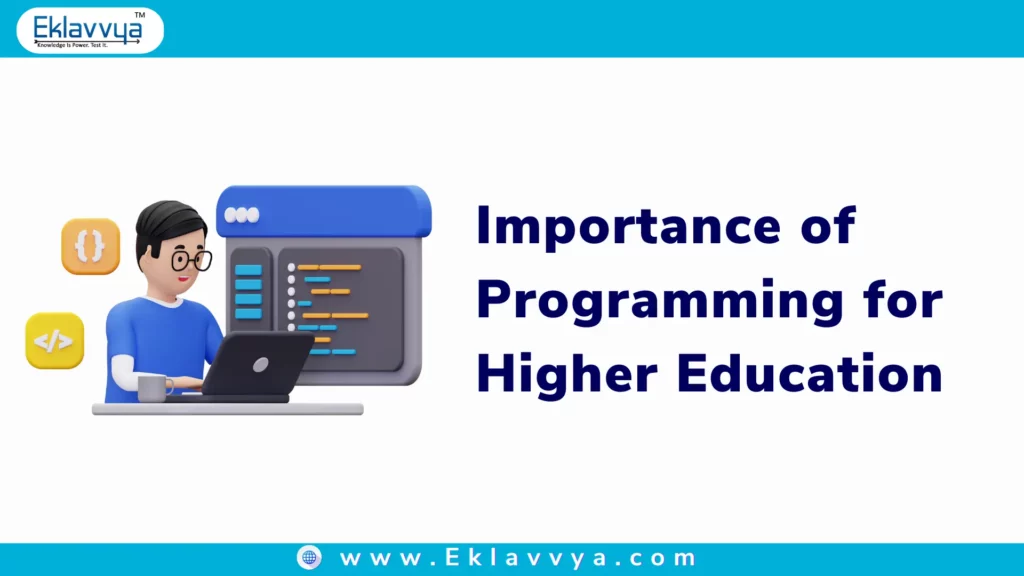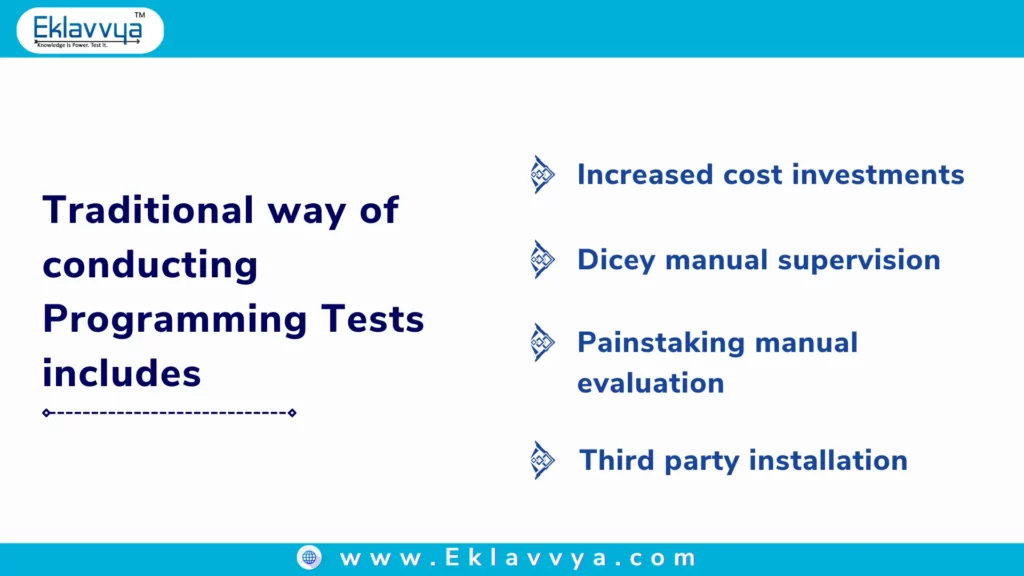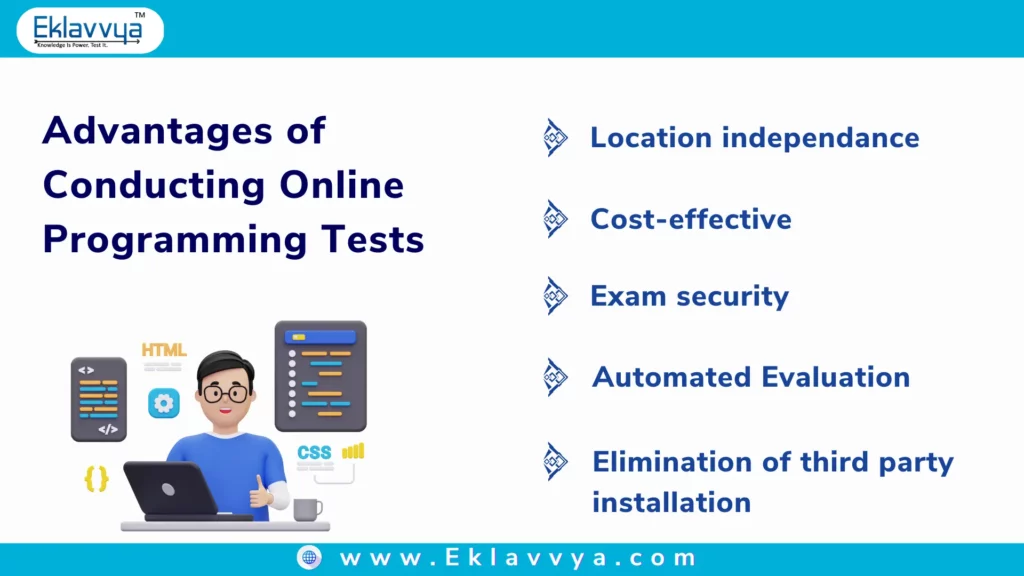
Article Contents
Importance of programming for schools
The first programming language was created as old as 1883. Since then programming or coding has been one of the most sought-after fields of study and work in the entire world.
Programming languages have become an integral part of every person’s life. Almost every field or industry makes use of some sort of programming language. It has become a skill that is essential to be learned not just for building a career but also for the fact that it is interesting and fun for everyone including kids.
Considering this fact, the schools have been including basic programming languages such as C or C++ in the curriculum. Even the Education Ministry realized the importance of coding and decided to include coding lessons from as low as 6th grade in the new draft of National Education Policies.
Learning programming languages help students to build a problem-solving attitude, develop resilience, create a thought procedure and expand their creativity. It also helps to improve their mathematical and cognitive ability.

Importance of programming for higher education institutions

There are some educational institutions that have been conducting programming competitions for students. These competitions could be among the students belonging to the same school or college or even on an inter-school or inter-collegiate level.
Conducting such competitions is important for colleges as they encourage students to study programming languages with interest. Many of these competitions also give away exciting awards or prizes to the winners.
Programming languages play a key role in higher education as well. The curriculum of many different courses such as Bachelor and Masters in Computer Science or Bachelor and Masters in Computer Applications majorly focus on computer languages.
These courses are designed to teach students programming languages from basic to advance. Thus, it is immensely important for them to conduct tests or assessments for testing the programming skills of the students.
The higher education institutes include programming exams during both theory and practical exams. While theory exams are given on paper, practicals are the exams wherein the students need to type the programs or codes on the system and compile them to obtain the necessary output.
Needless to say, practicals are important for both students and educational institutions. They are one of the best ways to make the students understand the importance of programming, not just for marks but also for their future.
Thus, programming language competitions or assessments are one of the best ways to encourage students to study these languages sincerely which in turn helps them to prepare themselves for a bright career.
The traditional way of conducting programming tests

Educational institutions have been conducting programming competitions or tests for a while now. Traditionally the tests were conducted in the schools/colleges either in the computer labs or classrooms.
If the test was held in the lab, the students were supposed to type the code and run it on the computers. The examiner would set the timer and once the time is up, check the code for any errors or loopholes.
They would then assign the marks manually and the student with the highest score would be declared the winner in case of competitions. Even the tests held in the classroom followed a similar process.
The students would write the code on the paper within the time provided and present it to the examiner. The calculation and assignment of marks were done manually by the faculty members and then the students’ performances would be gauged.
The traditional way of conducting competitions implied that the students who were competing against each other were supposed to sit together in one classroom and answer the programming questions. There was an increase in the manual efforts which had to be put in by the teachers or the administrative staff.
Need for the switch to an online mode of conducting programming tests-
1. Increased cost investments
Educational institutes need to invest a lot of money in infrastructure, facilities, and other logistics. These institutes are required to manage the invigilators for manual supervision. The traditional way thus brought about some extra expenses to be spent by the schools.
2. Dicey manual supervision
Manual or physical supervision is not necessarily the best way to monitor a large number of students sitting in the same room for a competition as it raises the chances of cheating or malpractices carried out by students.
The students might carry books or electronic devices while entering the classroom to copy the answers. They also could ask for answers from other students which might go unnoticed by the invigilators.
Even if the test was held in a computer lab, the students might try to open other windows on the system provided to them. They could try to browse the answers and copy them directly.
The fact that scoring the highest marks not only helps the students to receive gifts or prizes but also helps them to prove their mettle increases the possibility of cheating much more.
3. Painstaking manual evaluation
Programs or codes do require an extreme level of concentration during evaluation as even a small thing such as a comma or semi-colon can create a huge difference. During the traditional way of conducting competitions or tests, the teachers/examiners evaluate the answers manually.
Imagine the time and effort required to finish the evaluation work if there are 1000+ students appearing for the test! Manual evaluation is indeed tedious and also requires a bit too much manual effort not only for evaluation purposes but also for other tasks such as comparing the marks, analyzing the individual or group performance, processing the results, declaring the names of the highest scorers, etc.
4. Third-party installation
Different programming languages have different requirements when it comes to system compatibility. Educational institutions need to install third-party tools in every system so that the students would be able to use them conveniently.
Sometimes, this sort of the third party requires paid licenses or license keys. It also requires device compatibility so that the installation process goes on smoothly. Each time a new tool needs to be installed, the teachers or technicians need to go through the entire process of installation which is very time–consuming.
Thus, we can see that the traditional way of conducting programming tests was time-consuming, strenuous, costly, insecure, and unreliable. Due to this, there is a pressing need to find an alternative that would address all the shortcomings related to classroom-based programming assessments.
Advantages of conducting programming tests in online mode

As we have seen previously, traditional classroom-based assessments have many flaws were being overlooked until now. But the online platforms which help to conduct the competitive exams did consider everything and came up with an alternative solution.
They have developed a solution using which the programming competitions can be conducted online mode. Let us see how these online examination platforms help to overcome the shortcomings of classroom-based programming tests.
1. Location independence
The online exams, naturally, can be conducted from anywhere. The students do not need to visit the schools/ colleges or computer labs or any exam venue to participate. They can log into the available devices such as desktops, laptops, Ipads, mobile phones, etc., and launch the test.
They can participate from their own homes provided they have stable internet connectivity. This enables educational institutes to get the flexibility of conducting assessments anytime from anywhere.
2. Cost effective
Due to the freedom of location, the institute management does not need to focus on providing infrastructure or other facilities. They do not need to worry about providing a supervisor for physical supervision either.
The costs spent on logistics such as question papers or answer sheets or any other documents and their storage are completely eliminated, thus reducing the investments further.
3. Exam security
The online exam platforms come with the most robust and unique techniques to put a stop to cheating and malpractices. Techniques such as remote proctoring, secure browsers, audit logging, etc. help educational institutes to monitor the students during the tests.
Some other AI-based techniques such as facial recognition, object movement detection, background sound recognition, Chatbots, etc. additionally help to maintain the integrity of the assessments.
4. Automated Evaluation
The Automated Evaluation System is a dynamic tool that helps examiners and administrative staff to eliminate their manual efforts to a large extent.
The system can evaluate code against predefined test cases. If those test cases are verified then the system can assign evaluation marks for each successful test case output.
Other techniques used to grade the students include counting the number of lines written in the code, time is taken to compile, code efficiency, etc. The system not only can evaluate the answers, but it can also allot marks/grades.
5. Elimination of third-party installation
The online platforms conducting programming tests can be easily operated by anyone. This means that they do not require any device compatibility or setup before launching the exams.
These platforms can run on any system and eliminates the need for third-party installation completely. This helps to reduce the efforts of the teaching and administrative staff to a greater extent.
Clearly, conducting programming tests with the help of online platforms is much easier and more secure. Adopting such an exam platform would indeed prove very much beneficial to all the educational institutions that need to conduct programming tests on a daily basis.

How to Conduct Online Programming Tests?
- You can define Coding Question Bank with difficulty level and coding language.
- Define coding test pattern and timer.
- Assign it to candidates.
- The person needs to write code and compile it online in the secure exam window.
- The system compares the output with predefined test cases.
- You can analyze the coding or programming skills of the candidate using such tests.
How to compile code in an online programming test?
The online compiler would execute and show compile-time errors, and warnings. Online programming test executes with predefined test cases to check the success of the output
Conclusion
Programming tests are an inseparable part of the college curriculum. They help the colleges to assess a student’s technical knowledge and understanding of complex topics.
They help the students to measure their understanding of programming and the areas where they need to work on. With the help of these assessments, the students also get practice in the process of hiring carried out by different organizations.
Such online exam platforms are very much functional as they help to create a question bank which could include questions related to different programming languages, difficulty levels, marking levels, etc.
Eklavvya is a software platform that helps to conduct such programming competitions with all the advantages and security. By making use of the best technology available, Eklavvya helps to digitize the programming tests to a perfect optimum level.
It ensures that its customers do not face any kind of issue related to the simplicity of operating the tool, reliability, and cost as well. As a result of this, Eklavvya has become an award-winning platform with a very satisfied customer base.
Thakur Education Group has been using the Eklavvya platform to prepare their management students to be ready for the campus hiring process.
Each week specific no of tests are conducted to assess domain knowledge and the aptitude of the students.
Analytics provides a detailed analysis of student performance.
The system also provides inputs about weak areas of students so that they can prepare for the specific subject/ topic.
It is helping them to prepare for the campus selection process.

Thakur Education Group
Pune University Management Department (PUMBA) is using Online Assessment Platform Eklavvya to prepare their students for the campus placement drive.
Each Student needs to appear for a certain number of exams in the area of General Knowledge, Analytical Ability, Business Knowledge, Marketing, etc.
Preparing the students for the placement drive has become easier with the help of the Eklavvya Platform

Pune University
Online programming tests are a bit different from regular programming tests. While regular tests are taken face-to-face by a human being, online programming tests can be taken online by you. These tests are done online, which means they are completely digital. There is no human interaction at all, so there are no distractions in online tests. The questions are clearly defined and you can move at your own pace. You can use a computer, tablet, or phone to take online programming tests. Some even use a computer and a phone or a tablet and a phone at the same time to take online programming tests.
Attitude is the most important thing to get right on the first try. If you think that you will perform well in the interview, you will, but if you think that you will not, you will not. You should be confident in your ability to solve the problem. You should decide before the interview that the best way to solve the problem is by using a given technique and not by thinking out of the box. You should always be thinking about the problem at hand and not about your confidence, skills, and abilities. If you think that you are going to fail in the interview, then you will fail. You think about how to solve the problem, not about how you are going to solve it.
A good online programming software must have at least the following features:
-Easy to use
-Affordable
-Easy to embed
-Supports all the major web platforms or programming languages
-Many pre-built features
-Good documentation
-Frequent updates
-Quick support
There are several reasons why educational institutes should consider using online coding platforms to conduct programming tests.
First, online coding platforms provide a convenient and efficient way to administer programming tests, allowing examiners to quickly and easily set up and manage the tests.
Second, online coding platforms can provide a consistent and fair experience for all exam takers, as the platform can automatically grade and evaluate the tests in a consistent manner.
Third, online coding platforms can provide real-time feedback and data analysis, allowing examiners to monitor the progress of the test and identify any issues or concerns.
Finally, online coding platforms can be a cost-effective solution, as they can reduce the need for physical infrastructure and resources, such as computers and staff, to administer the tests.
Yes, it is possible to evaluate coding skills using online coding tests with accuracy.
Online coding tests typically use specialized software and algorithms that are designed to accurately and consistently evaluate the coding skills of exam takers.
The software can automatically grade and evaluate the tests, providing a consistent and fair experience for all exam takers. In addition, online coding tests can provide real-time feedback and data analysis, allowing examiners to monitor the progress of the test and identify any issues or concerns.
Overall, online coding tests can be an effective and reliable method for evaluating coding skills.



![How Government-Led Exams at 250+ Locations Are Setting New Standards of Integrity [Case Study]](https://www.eklavvya.com/blog/wp-content/uploads/2024/04/Enhancing-Exam-Integrity-Government-Certification-in-250-Locations-150x150.webp)
![Transforming Central Govt. Exams Evaluation: How Onscreen Marking is Leading the Charge [Case Study]](https://www.eklavvya.com/blog/wp-content/uploads/2024/04/How-Onscreen-Marking-Revolutionized-Central-Govt-Exams-Case-Study-1-150x150.webp)














![How Onscreen Marking Revolutionized Central Govt Exams [Case Study]](https://www.eklavvya.com/blog/wp-content/uploads/2024/04/How-Onscreen-Marking-Revolutionized-Central-Govt-Exams-Case-Study-1-300x300.webp)

